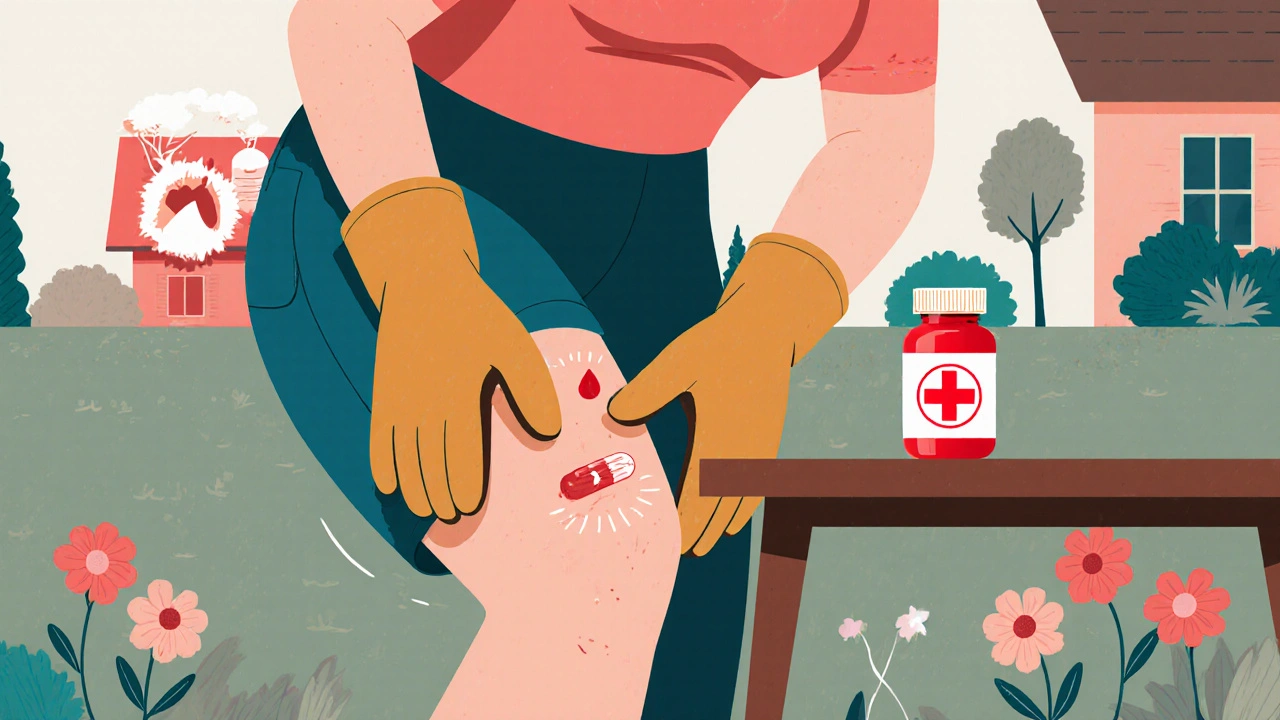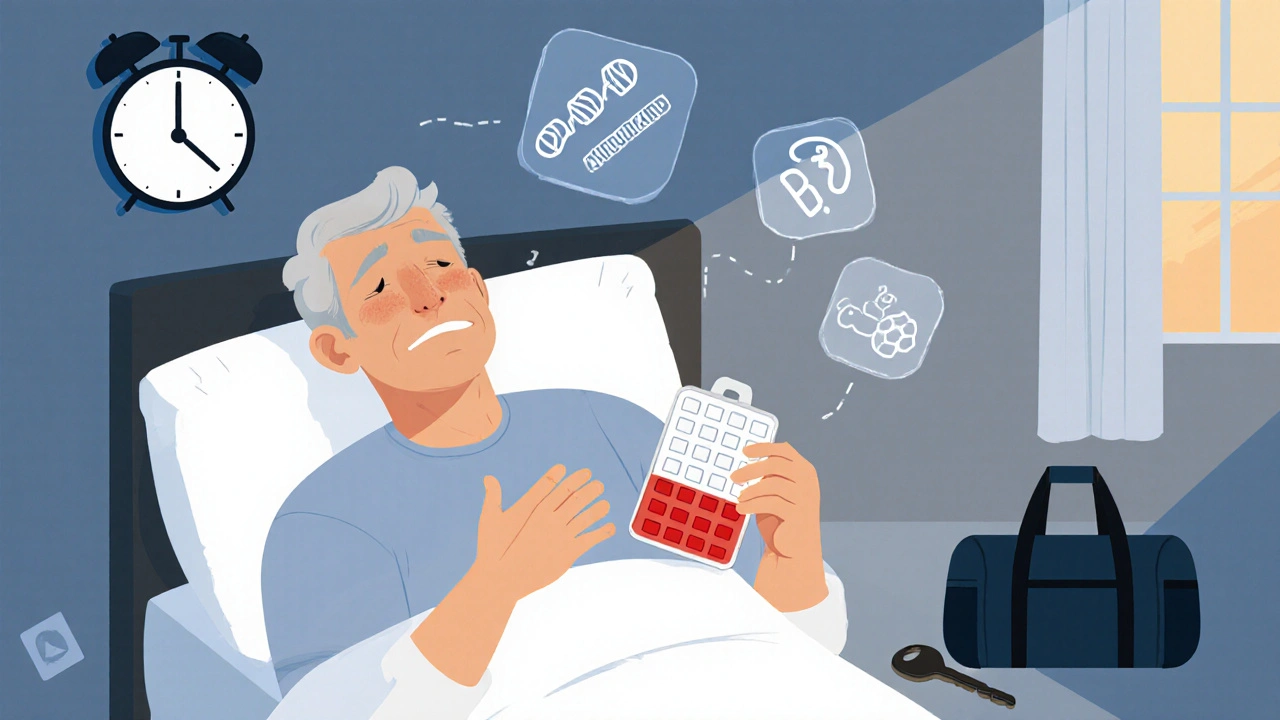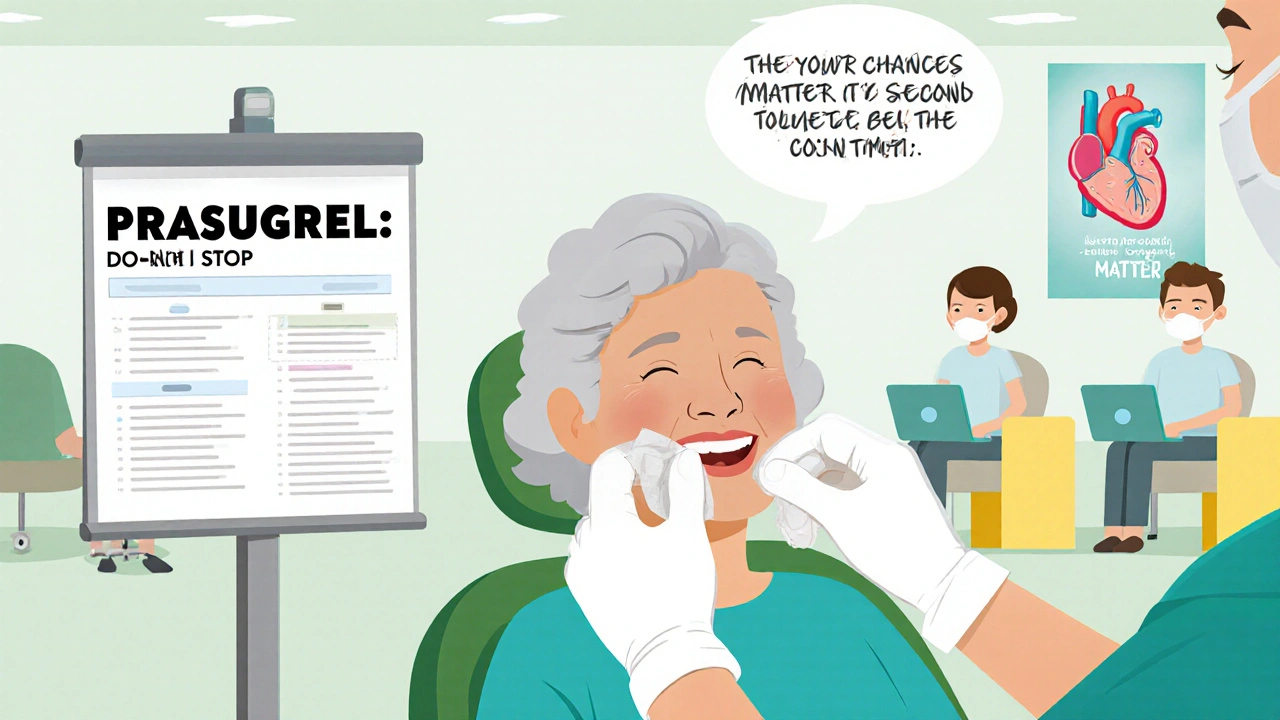Prasugrel in the Real World: Patient Stories and Experiences
 Nov, 4 2025
Nov, 4 2025
When you’re told you need prasugrel after a heart attack or stent placement, the doctor’s words blur. You hear ‘blood thinner,’ ‘prevent clots,’ and ‘take daily’-but no one tells you what it actually feels like to live with it. Not the clinical facts. Not the side effects listed in the pamphlet. The real stuff: the panic when you scrape your knee and it won’t stop bleeding, the guilt over skipping a dose because you forgot, the quiet fear that this pill is keeping you alive-but at what cost?
Why Prasugrel? Not Just Another Blood Thinner
Prasugrel, sold under the brand name Effient, isn’t just another antiplatelet drug. It’s stronger and faster-acting than clopidogrel, the older option many patients have been on for years. It works by blocking a specific receptor on platelets-P2Y12-so they can’t stick together and form clots. That’s critical after a heart attack or stent placement, where even a tiny clot can block blood flow and cause another event.
Studies show prasugrel reduces the risk of heart attack, stroke, or death by about 19% compared to clopidogrel in patients with acute coronary syndrome who’ve had stents. But it’s not for everyone. People over 75, under 60 kg (132 lbs), or with a history of stroke or TIA are usually advised against it. The risk of serious bleeding outweighs the benefit.
That’s why doctors don’t hand it out like candy. It’s prescribed when the stakes are high and the patient’s profile fits. And that’s where the real-world stories begin-not in clinical trials, but in kitchens, cars, and hospital waiting rooms.
Janet’s Story: The Scraped Knee That Changed Everything
Janet, 68, had a heart attack in March 2024. She got a stent and was put on prasugrel. She’d been on clopidogrel before and didn’t like how slow it felt. Her cardiologist said prasugrel was better for her case-she was young for her age, active, and had a large clot burden.
Two months in, she scraped her knee gardening. Just a little cut. But it kept oozing. For hours. She called her daughter, who rushed her to urgent care. The nurse looked at the wound and said, ‘You’re on a strong one, aren’t you?’
That was the moment Janet realized prasugrel wasn’t just a pill. It was a lifestyle shift. She stopped gardening without gloves. She started checking her skin every day. She carries a small first-aid kit with pressure bandages everywhere-even to the grocery store. She still takes her pill every morning, but now she knows: this isn’t just about preventing heart problems. It’s about surviving a fall, a cut, a nosebleed.
Marcus: The Missed Dose and the Hospital Visit
Marcus, 54, got two stents after a heart attack in June 2024. He was prescribed prasugrel and aspirin. He took them religiously for six weeks. Then he went on a business trip. Busy schedule. Jet lag. He missed a dose. Didn’t think much of it.
Two days later, he woke up with crushing chest pain. He thought it was indigestion. But the pain didn’t fade. He called 911. An EKG showed a new blockage. He was rushed back in. They did another angiogram. A tiny clot had formed where one of the stents sat.
‘You missed one dose,’ the cardiologist said. ‘With prasugrel, that’s enough.’
Marcus now uses a pill organizer with alarms. He keeps extra pills in his car, his work bag, his gym locker. He tells his coworkers he’s on a blood thinner-not to be pitied, but so they know if he ever collapses, it’s not a heart attack waiting to happen. It’s already happened. And he’s still here.

Barbara’s Dilemma: The Tooth Extraction That Broke the Rules
Barbara, 71, had a stent placed in January 2024. She was on prasugrel and aspirin. In August, she needed a tooth pulled. Her dentist asked if she could stop the medication. She called her cardiologist.
‘No,’ he said. ‘You’re not stopping it.’
Barbara was scared. She’d heard stories of people bleeding out after dental work. But her doctor explained: the risk of a clot forming without prasugrel was higher than the risk of bleeding from a tooth extraction. He gave her a special rinse, told her to apply pressure for 30 minutes, and to avoid hot foods and straws.
She went through with it. Bleeding lasted two days. It was messy. She had to sleep sitting up. But she didn’t have a heart attack. She didn’t have a stroke. She just had a sore mouth.
Now she tells every patient she meets at her senior center: ‘Don’t let your dentist scare you into stopping your heart meds. Talk to your cardiologist first. They know your risk better than anyone.’
The Bleeding Risk: What No One Tells You
Prasugrel’s biggest downside is bleeding. Not the kind you see in ads-minor nosebleeds or bruising. The kind that lands you in the ER. Gastrointestinal bleeding. Brain bleeds. Bleeding after surgery.
One study published in the Journal of the American College of Cardiology in 2023 found that 3.8% of patients on prasugrel had major bleeding within a year, compared to 2.5% on clopidogrel. That’s a real difference. And it’s why doctors screen so carefully before prescribing it.
But here’s what patients don’t hear enough: the bleeding risk drops sharply after the first year. Most patients stay on prasugrel for 12 months after a stent. After that, many switch to aspirin alone. That’s when the danger eases.
Still, you need to know the signs: blood in stool, black tarry stools, vomiting blood, sudden headaches, dizziness, unexplained bruising. If you see any of these, don’t wait. Call your doctor or go to the ER. It’s not an emergency you can ‘wait and see’ through.

Life After the Pill: What Comes Next
Prasugrel doesn’t cure anything. It doesn’t fix your arteries. It doesn’t undo the damage from smoking, poor diet, or stress. It just gives you time. Time to change. Time to rehab. Time to learn.
Many patients on prasugrel end up joining cardiac rehab. They start walking. Eating more vegetables. Cutting back on salt. Some lose weight. Others quit smoking. One man I spoke to started meditating every morning-just to calm the anxiety that came with knowing his body was so fragile.
And yes, some people get tired of the pills. The constant reminders. The fear. The way friends stop inviting them to hike or ski. But most don’t regret taking it. Not after what they’ve been through.
‘I’d rather live with a few bruises than die from a clot,’ said Linda, 62, who’s been on prasugrel for 18 months. ‘I’m not scared of the pill. I’m scared of what happens if I stop.’
What to Ask Your Doctor
If you’re considering prasugrel-or already on it-here are five questions you should ask:
- Am I at high risk for another heart event? Why is prasugrel better for me than clopidogrel?
- What’s my bleeding risk based on my age, weight, and medical history?
- How long will I need to take this? Will I switch to something else later?
- What should I do if I miss a dose?
- What symptoms mean I need to go to the hospital right away?
Don’t be afraid to ask again if you don’t understand. Write down the answers. Bring someone with you. This isn’t just about taking a pill. It’s about understanding your body’s new rules.
Final Thoughts: Living With a Powerful Medicine
Prasugrel isn’t a magic bullet. It’s a tool. A powerful, precise tool that can save your life-or make a small injury dangerous. It demands respect. It asks you to be careful, aware, and proactive.
The people who do well on it aren’t the ones who follow the rules perfectly. They’re the ones who learn from their mistakes. Who ask questions. Who tell their family what’s going on. Who carry their pill organizer like a lifeline.
If you’re on prasugrel, you’re not just a patient. You’re someone who’s been given a second chance. And second chances come with responsibilities. But they also come with hope.
You’re not alone. Thousands of people are taking this pill every day. Some are scared. Some are angry. Some are grateful. But they’re all still here. And that matters more than any statistic.
Is prasugrel better than clopidogrel?
For many patients with acute coronary syndrome who’ve had a stent, prasugrel works faster and more effectively than clopidogrel at preventing heart attacks and strokes. Studies show it reduces major cardiovascular events by about 19% compared to clopidogrel. But it also carries a higher risk of serious bleeding. Your doctor will choose based on your age, weight, medical history, and bleeding risk.
Can I drink alcohol while taking prasugrel?
Moderate alcohol use is generally okay, but heavy drinking increases your risk of stomach bleeding, especially when combined with prasugrel and aspirin. If you drink regularly, talk to your doctor. They may suggest cutting back or switching to a different medication if your bleeding risk is already high.
What should I do if I miss a dose of prasugrel?
If you miss a dose, take it as soon as you remember. But if it’s almost time for your next dose, skip the missed one and go back to your regular schedule. Never take two doses at once. Missing doses increases your risk of a clot forming, especially in the first few months after a stent. Use alarms or a pill organizer to stay on track.
How long do I need to take prasugrel?
Most patients take prasugrel for 12 months after a stent or heart attack. After that, your doctor may switch you to low-dose aspirin alone, depending on your ongoing risk. Never stop prasugrel on your own-even if you feel fine. Stopping too soon can trigger a life-threatening clot.
Can I take ibuprofen or other painkillers with prasugrel?
Avoid regular use of NSAIDs like ibuprofen or naproxen-they increase bleeding risk and can interfere with prasugrel’s effect. Use acetaminophen (Tylenol) for pain instead. If you need NSAIDs for a short time, talk to your doctor first. They may adjust your medications or monitor you more closely.
Does prasugrel cause weight gain or fatigue?
Prasugrel itself doesn’t cause weight gain or tiredness. But many patients feel fatigued after a heart event or stent procedure, and that’s normal during recovery. If you’re unusually tired or gaining weight rapidly, it could signal heart failure or another issue. Always report new symptoms to your doctor.

Erika Puhan
November 5, 2025 AT 10:29Prasugrel’s 19% relative risk reduction sounds impressive until you realize the absolute difference is like 1.8% over a year. That’s one life saved per 56 patients treated. Meanwhile, major bleeding risk jumps from 2.5% to 3.8%. The NNT vs. NNH calculus here is ethically murky-especially when you factor in non-compliance rates and real-world polypharmacy. This isn’t precision medicine; it’s probabilistic gambling with hemorrhagic outcomes.
Edward Weaver
November 7, 2025 AT 03:19Y’all are overcomplicating this. In America, we don’t pussyfoot around with clopidogrel like some European softie. Prasugrel’s the real deal-fast, strong, no-nonsense. If you can’t handle it, maybe you shouldn’t be driving a car or climbing stairs. My uncle got two stents, took prasugrel, and went back to lifting weights at 70. Stop whining about bruising and start being grateful you’re alive.
Lexi Brinkley
November 8, 2025 AT 00:26OMG I JUST REALIZED I’M ON PRASUGREL TOO 😱 I thought my nosebleeds were just allergies but now I get it… I carry bandages in my purse like a ninja 🥷🩹 and my dog knows when I’m about to bleed because he licks my hands 😂
Kelsey Veg
November 9, 2025 AT 11:28so like… i missed my dose once bc i was drunk and then i got a huge bruise on my thigh that looked like a map of africa. my dr said ‘lol’ and told me to get a pillbox. now i have one shaped like a heart. it’s cute. but i still forget sometimes. 🤷♀️
Alex Harrison
November 10, 2025 AT 17:00I’ve been on prasugrel for 14 months now. I didn’t realize how much I was avoiding stairs until I started doing cardiac rehab. Now I take the stairs everywhere. I keep my pills in my wallet. I told my coworkers so they know if I pass out it’s not because I’m lazy. I still get scared when I cut myself. But I’m alive. And that’s worth the bruising.
Jay Wallace
November 12, 2025 AT 12:19Let’s be clear: prasugrel is not a ‘lifestyle pill.’ It is a high-stakes, pharmacologically aggressive intervention reserved for high-risk ACS patients with optimal anatomical and physiological profiles. The notion that patients can casually ‘adapt’ to it without rigorous monitoring is dangerously misguided. Your dentist? Your yoga instructor? They are not qualified to assess your thrombotic risk. Consult your interventional cardiologist-or stop pretending you’re in control.
Alyssa Fisher
November 13, 2025 AT 21:46There’s something deeply human about how this drug forces you to become a student of your own body. You learn to read the silence between your heartbeat. You notice the way a bruise blooms slower than it used to. You start to see vulnerability not as weakness, but as a kind of attention-a daily practice of staying present. Prasugrel doesn’t just thin your blood. It thickens your awareness.
Alyssa Salazar
November 15, 2025 AT 17:25Guys, the bleeding risk drops after year one? YES. And here’s the thing-most of us are on it for 12 months because that’s the window where the clot risk is highest. After that? Aspirin’s usually fine. But if you’re 65+, under 130 lbs, or have GI issues? Don’t be a hero. Ask for alternatives. Clopidogrel isn’t weak-it’s just not for everyone. And that’s okay. Your heart doesn’t care about your ego.
Beth Banham
November 16, 2025 AT 23:34I’m on prasugrel. I don’t talk about it much. But I carry a small first-aid kit in my purse. I don’t garden barehanded anymore. I smile at other people who look like they’re trying not to cry in the pharmacy line. We don’t need to say anything. We just know.